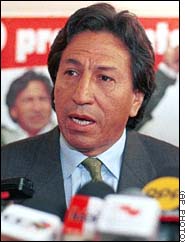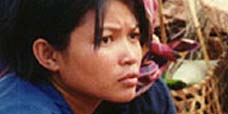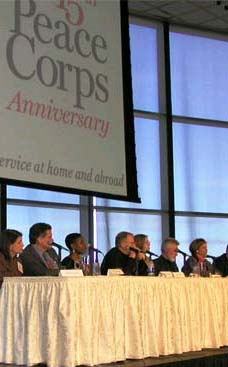
At stake is a legacy that many Peruvians seem ready to dismiss as a squandered opportunity. The former economist has crisscrossed the country in recent weeks touting steady economic growth, but raw numbers won't keep him from exiting the presidential palace as one of the least popular Latin American leaders in recent history. Toledo says impatience and unrealistic expectations have undercut his standing, but personal scandals and a reputation for incompetence have also hurt. President Alejandro Toledo of Peru was a language instructor for the Peace Corps in the 1960's. In 2002, Toledo invited the Peace Corps to return to Peru after a 27 year absence.
Toledo fights for legacy
Peru's Leader Fights for Legacy
Election Today May Alter Economic Path Followed by Toledo
By Monte Reel
Washington Post Foreign Service
Sunday, April 9, 2006; Page A18
LIMA, Peru, April 8 -- Consecutive term limits prevent President Alejandro Toledo's name from appearing on Sunday's presidential ballot, but he is campaigning like a man with a lot to lose as the clock runs out on his five years in office.
At stake is a legacy that many Peruvians seem ready to dismiss as a squandered opportunity. The former economist has crisscrossed the country in recent weeks touting steady economic growth, but raw numbers won't keep him from exiting the presidential palace as one of the least popular Latin American leaders in recent history.
Toledo says impatience and unrealistic expectations have undercut his standing, but personal scandals and a reputation for incompetence have also hurt. The discontent has set the stage for an election that raises the type of questions being grappled with by voters throughout Latin America: Is it enough for a leader to settle for the economic gains available to those who play by the rules of the international marketplace, or are more radical measures needed in countries burdened by poverty on a scale unknown in developed countries?
"Peru cannot be refounded every five years," Toledo said from behind a lectern at the presidential palace this week, urging the next president to build on his government's market-based economic policies. "True revolutionaries are those that brandish pencils, notebooks and computers to narrow the gap between the haves and have-nots."
But the front-runner in Sunday's election is proposing more drastic measures. Ollanta Humala, a nationalistic ex-military commander, says wealth must be distributed more broadly -- even if that means defying some of the multinational corporations and foreign governments that have tried to draw Peru further into the international economy. Humala's supporters are unruffled by critics who compare him to Venezuela's Hugo Chavez, another self-described revolutionary and his friend.
Polls show Humala, 43, with a slight lead over Lourdes Flores Nano, a former congresswoman who supports free markets, and former president Alan Garcia, who left office in 1990 at a time of runaway inflation and regular terrorist attacks by Maoist guerrilla groups. If none of the candidates gets a majority of the vote, the top two finishers will face off in a second round in May.
Toledo has avoided naming names in his increasingly agitated public announcements about the importance of democratic institutions and international markets, but his target is clear: Humala represents the flip side of some of his government's main priorities.
Toledo hopes to sign a free-trade deal with the United States before he leaves office, but Humala has vowed to scrap the plan if elected. Humala also regularly rails against one of the biggest investments of Toledo's term -- the multibillion-dollar Camisea gas pipeline, which has been plagued by a series of accidental explosions in recent months. He is calling for a redrafting of the contracts of the multinational companies that operate it.
Even if Peru, like Venezuela and Bolivia, elects a socialist firebrand promising deep social and economic restructuring, it won't necessarily reflect a clear shift to the ideological left in the neighborhoods and villages.
According to pollsters, many voters support Humala for the same reasons they chose Toledo in 2001 and authoritarian President Alberto Fujimori in the 1990s: He promises change and the possibility of increased government spending on projects that will directly reach them. Discourse on right-vs.-left, free trade and the importance of democratic institutions mean little to most Humala supporters, they suggest.
"This is why Toledo failed: because he didn't realize why voters elected him," said Alfredo Torres, director of Apoyo, Peru's main polling firm. "Toledo has cared more about his image outside of the country than taking care of the electorate."
In 2001, Toledo was seen as the antidote to Fujimori, an opposition leader who promised more jobs and a break from corruption. Like the Bolivian president, Evo Morales, Toledo was his country's first president of indigenous descent and was a rags-to-riches symbol for a majority that lives in poverty. He grew up with 15 siblings, worked as a shoeshine boy, landed scholarships to U.S. universities and eventually became an economist and professor.
But his approval ratings sank after several petty corruption scandals implicated members of his family. A reputation for dishonesty was reinforced when his repeated denials of fathering a child out of wedlock were proved false. Criticisms that he turned his back on the poor were illustrated in editorial cartoons that mocked his taste for Johnny Walker Blue Label scotch, which sells for about $175 a bottle here.
For most of his term, his approval ratings were stuck at about 10 percent, though they have recently inched into the teens.
"I voted for Toledo, but unfortunately I was mistaken," said Jose Antonio Ordoñez, 25, a taxi driver attending a political rally for Garcia on Thursday night. "He promised a lot, especially more jobs, but it didn't really happen."
All three of the front-running candidates have tried to distance themselves from Toledo, and Flores has had the hardest time doing it. She is the only of the three who unequivocally supports free trade with the United States. But she has emphasized that she would do more than Toledo to make sure the macroeconomic growth reaches the poor.
Garcia, who ran in 2001, has also tried to step clear of Toledo's shadow, portraying himself as a moderate who has learned from the past and deserves a second chance.
"Because Toledo has become known as just another politician, it has led to a rejection of all traditional politicians, of which Garcia is one," said Michael Shifter, an analyst for the Inter-American Dialogue, a policy forum based in Washington.
The thought of another Chavez ally taking the helm in Latin America and a turn away from international markets clearly is not a pleasant one in Washington. The lack of recognition among voters for the economic benefits Peru has experienced during Toledo's term -- including a 5 percent annual growth rate, a doubling of exports and reduced foreign debt -- troubles those who believe his performance compares favorably with other presidents elected since Peru reinstituted its electoral democracy in 1980.
"The sad thing is that only in the past two years have the per capita income figures reached the levels they were in 1980," said a U.S. Embassy official in Lima. If voters "get this wrong again, they could be set back from a pretty nice base that they have right now."
Without being able to comment directly on his possible successors, Toledo can only wait to see how the country responds on Sunday to his presidency: "May God enlighten the voters," he said Friday.
Special correspondent Lucien Chauvin contributed to this report.


















